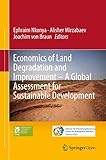Economics of land degradation and improvement [electronic resource] : a global assessment for sustainable development / Edited by Ephraim Nkonya, Alisher Mirzabaev & Joachim Von Braun.
Material type: TextPublication details: Cham : Springer Open, 2016.Description: 1 online resourceISBN:
TextPublication details: Cham : Springer Open, 2016.Description: 1 online resourceISBN: - 978-3-319-19167-6
| Item type | Current library | Call number | Status | Date due | Barcode | |
|---|---|---|---|---|---|---|
| E-Resources | Main Library E-Resources | 333.7 Ec19 (Browse shelf(Opens below)) | Available | E002349 |
Includes bibliographical references and index.
1. Economics of Land Degradation and Improvement: An Introduction and Overview / Ephraim Nkonya, Alisher Mirzabaev and Joachim von Braun -- 2. Concepts and Methods of Global Assessment of the Economics of Land Degradation and Improvement / Ephraim Nkonya, Joachim von Braun, Alisher Mirzabaev, Quang Bao Le, Ho-Young Kwon and Oliver Kirui -- 3. Institutional Framework of (In)Action Against Land Degradation / Philipp Baumgartner and Jan Cherlet -- 4. Biomass Productivity-Based Mapping of Global Land Degradation Hotspots / Quang Bao Le, Ephraim Nkonya and Alisher Mirzabaev -- 5. Evaluating Global Land Degradation Using Ground-Based Measurements and Remote Sensing / Weston Anderson and Timothy Johnson -- 6. Global Cost of Land Degradation / Ephraim Nkonya, Weston Anderson, Edward Kato, Jawoo Koo, Alisher Mirzabaev, Joachim von Braun and Stefan Meyer -- 7. Global Drivers of Land Degradation and Improvement / Alisher Mirzabaev, Ephraim Nkonya, Jann Goedecke, Timothy Johnson and Weston Anderson. 8. Global Estimates of the Impacts of Grassland Degradation on Livestock Productivity from 2001 to 2011 / Ho-Young Kwon, Ephraim Nkonya, Timothy Johnson, Valerie Graw, Edward Kato and Evelyn Kihiu -- 9. Economics of Land Degradation in Sub-Saharan Africa / Ephraim Nkonya, Timothy Johnson, Ho Young Kwon and Edward Kato -- 10. Economics of Land Degradation in Central Asia / Alisher Mirzabaev, Jann Goedecke, Olena Dubovyk, Utkur Djanibekov, Quang Bao Le and Aden Aw-Hassan -- 11. Economics of Land Degradation in Argentina / Mariana E. Bouza, Adriana Aranda-Rickert, María Magdalena Brizuela, Marcelo G. Wilson, Maria Carolina Sasal, Silvana M.J. Sione, Stella Beghetto, Emmanuel A. Gabioud, José D. Oszust, Donaldo E. Bran, Virginia Velazco, Juan J. Gaitán, Juan C. Silenzi, Nora E. Echeverría, Martín P. De Lucia, Daniel E. Iurman, Juan I. Vanzolini, Federico J. Castoldi, Joaquin Etorena Hormaeche, Timothy Johnson, Stefan Meyer and Ephraim Nkonya -- 12. Economics of Land Degradation and Improvement in Bhutan / Ephraim Nkonya, Raghavan Srinivasan, Weston Anderson and Edward Kato -- 13. Economics of Land Degradation in China / Xiangzheng Deng and Zhihui Li -- 14. Economics of Land Degradation and Improvement in Ethiopia / Samuel Gebreselassie, Oliver K. Kirui and Alisher Mirzabaev. 15. Economics of Land Degradation in India / Gurumurthy Mythili and Jann Goedecke -- 16. Economics of Land Degradation and Improvement in Kenya / Wellington Mulinge, Patrick Gicheru, Festus Murithi, Peter Maingi, Evelyne Kihiu, Oliver K. Kirui and Alisher Mirzabaev -- 17. Economics of Land Degradation and Improvement in Niger / Bokar Moussa, Ephraim Nkonya, Stefan Meyer, Edward Kato, Timothy Johnson and James Hawkins -- 18. The Economics of Land Degradation in Russia / Alexey Sorokin, Aleksey Bryzzhev, Anton Strokov, Alisher Mirzabaev, Timothy Johnson and Sergey V. Kiselev -- 19. Cost, Drivers and Action Against Land Degradation in Senegal / Samba Sow, Ephraim Nkonya, Stefan Meyer and Edward Kato -- 20. Economics of Land Degradation and Improvement in Tanzania and Malawi / Oliver K. Kirui -- 21. Economics of Land Degradation and Improvement in Uzbekistan / Aden Aw-Hassan, Vitalii Korol, Nariman Nishanov, Utkur Djanibekov, Olena Dubovyk and Alisher Mirzabaev.
This volume deals with land degradation, which is occurring in almost all terrestrial biomes and agro-ecologies, in both low and high income countries and is stretching to about 30% of the total global land area. About three billion people reside in these degraded lands. However, the impact of land degradation is especially severe on livelihoods of the poor who heavily depend on natural resources. The annual global cost of land degradation due to land use and cover change (LUCC) and lower cropland and rangeland productivity is estimated to be about 300 billion USD. Sub-Saharan Africa (SSA) accounts for the largest share (22%) of the total global cost of land degradation. Only about 38% of the cost of land degradation due to LUCC--which accounts for 78% of the US$300 billion loss--is borne by land users and the remaining share (62%) is borne by consumers of ecosystem services off the farm. The results in this volume indicate that reversing land degradation trends makes both economic sense, and has multiple social and environmental benefits. On average, one US dollar investment into restoration of degraded land returns five US dollars. The findings of the country case studies call for increased investments into the rehabilitation and restoration of degraded lands, including through such institutional and policy measures as strengthening community participation for sustainable land management, enhancing government effectiveness and rule of law, improving access to markets and rural services, and securing land tenure. The assessment in this volume has been conducted at a time when there is an elevated interest in private land investments and when global efforts to achieve sustainable development objectives have intensified. In this regard, the results of this volume can contribute significantly to the ongoing policy debate and efforts to design strategies for achieving sustainable development goals and related efforts to address land degradation and halt biodiversity loss.
There are no comments on this title.

